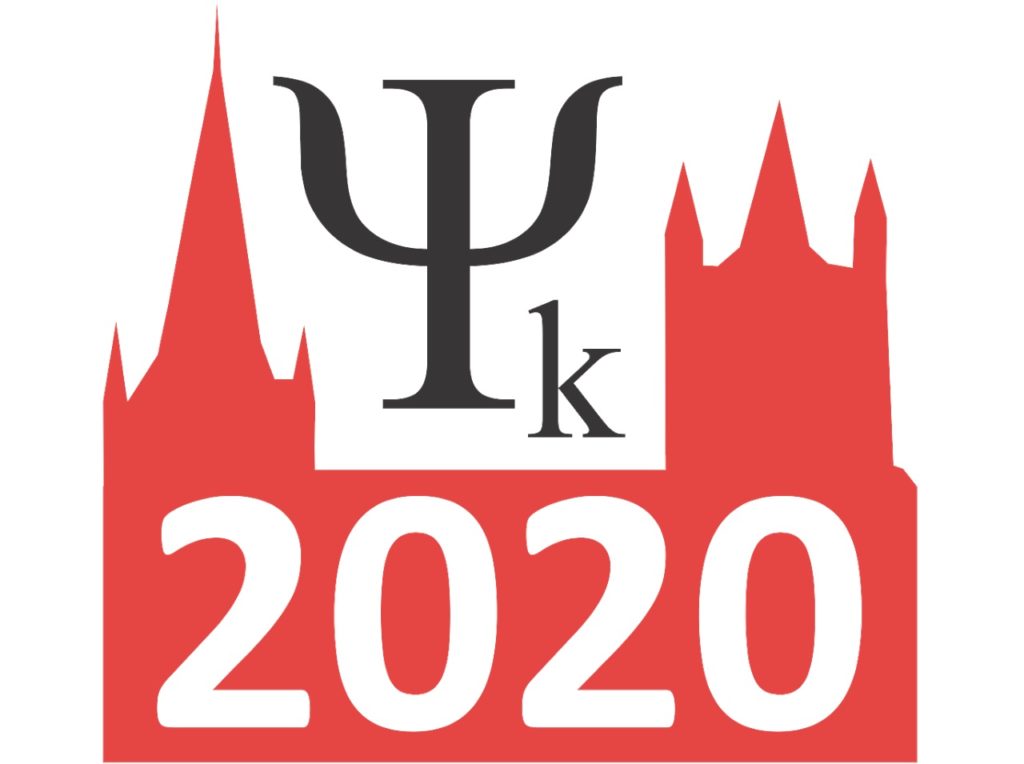SwissTech Convention Centre, Lausanne, Switzerland
Monday 14 – Thursday 17 September 2020
IMPORTANT NOTICE
With the current COVID-19 situation causing the cancellation of major events and conferences around the world, there is now significant uncertainty regarding Psi-k 2020 as well. Although we are still hoping that the conference can take place as planned, we are following the evolution of the situation closely and expect to have a clearer idea in the next few weeks regarding whether to maintain the event, or whether to postpone it to next year.
In order to avoid incurring any potential cancellation costs, we recommend that you refrain from making any travel plans for the time being.
The registration system has been suspended until a final decision is made — if the conference is maintained this year, all registration deadlines will be extended. Participants who had already registered will be contacted once a final decision is made.
Thank you for your patience in these exceptional time, and stay safe!
This is the largest event worldwide in first-principles simulations; it is held every 5 years (the last two editions, in Berlin in 2010 and in San Sebastian in 2015, had more than 1000 participants each), and with 7 plenary talks, 140 invited talks, and 170 contributed talks it promises to be the most exciting, defining event in the field.
Early-bird deadline is May 1, 2020 – one can register right away, and submit an abstract later (by May 1, 2020, to be considered for a contributed talk, or by Aug. 1, 2020, for a poster). All information – including registration, program, accommodation, and childcare – is available at https://www.psik2020.net.
The conference
- 3.5 days (from 2pm Sept. 14, 2020, to the evening of Sept. 17)
- 7 plenary talks
- 39 symposia
- 6 parallel sessions
- ~140 invited talks
- ~170 contributed talks
- 1 MAD evening to shake it all off!
Important deadlines
- May 1, 2020 — Early-bird registration deadline REGISTRATIONS ARE NOW OPEN!
- May 1, 2020 — Abstract submission deadline to be considered for contributed oral presentations
- May 1, 2020 — Deadline for “Volker Heine Award” applications (to be advertised soon)
- Aug. 1, 2020 — Regular registration deadline
- Aug. 1, 2020 — Abstract submission deadline, posters only
- Sept. 6, 2020 — Late registration deadline
- Sept. 14–17, 2020 — Psi-k 2020 Conference
Plenary speakers
- Gábor Csányi, University of Cambridge, UK
- Feliciano Giustino, University of Texas at Austin, USA
- Sharon Hammes-Schiffer, Yale University, USA
- Francesco Mauri, University of Rome Sapienza, Italy
- Angelos Michaelides, University College London, UK
- Lucia Reining, Ecole Polytechnique, France
- Nicola Spaldin, ETH Zurich, Switzerland
Symposia
A | Physical Formalisms
- Density and density-matrix functional theories
- Novel theoretical and computational developments in diagrammatic many body theory
- Strong correlations beyond local approximations
- Open quantum systems and non-adiabatic dynamics
- Emerging aspects of electron-phonon interactions
- Strongly correlated materials
- Exciting core electrons
- New developments in quantum Monte Carlo simulation
- Frontiers of DFT and beyond
- Extreme non-linear optics
- Excitons in complex materials
- Non-equilibrium physics
- New developments in first principles calculations of charge and heat transport
B | Algorithms, Software and Data
- Recent progress in reduced scaling methods: from quantum chemistry and DFT to second-principles
- Statistics and configuration sampling
- Electrified solid-liquid interfaces
- Software engineering: libraries for electronic structure applications
- Machine-learned surrogate models: the quest for ab initio accuracy at a fraction of the cost
- Machine learning for many-body quantum physics
- Structure searching and crystal structure prediction
- Materials discovery by high-throughput screening and artificial intelligence
- Emerging and future computing
- Current and future challenges associated with data infrastructure and reproducibility
C | Applications to Real Materials and Materials Design
- Ab initio guided design of structural materials
- Functional materials and devices
- Magnetism and spintronics
- Surfaces and interfaces at realistic conditions
- New physics in 2D materials and van der Waals multilayers
- Molecules, macromolecules and biomolecules: challenges and new opportunities for electronic structure methods
- Twisted bilayer materials
- Topological properties in real and momentum space
- Strong spin-orbit and magnetic systems
- Materials for energy
- Polaron and excitons: fundamentals of charge trapping and its impact in applications
- Electronic structure calculations and molecular modeling in industry
- Interfacial water: structures and dynamics
D | Simulations across Domains (joint with CECAM)
- Statistical mechanics and multiscale modeling
- The broader picture
E | Volker Heine Young Investigator Award

